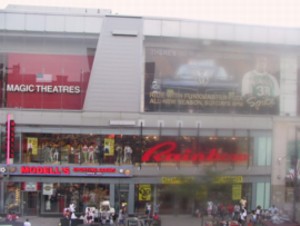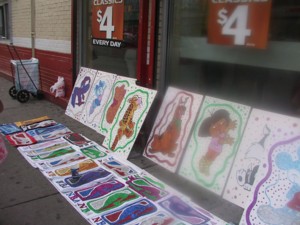|
 Is
the commercialization of an urban neighborhood a threat
or an opportunity? Vendors and independent storeowners on
125th street, who have seen the great changes across the
commercial strip and can attest to the presence of gentrification,
do not all share the same outlook on its presence. The existence
of gentrification, however, is not in question. As a mere
bystander, I can see how 125th street resembles a carbon
copy of the Times Square monopolized sidewalks, with only
scintillations of small, black-owned enterprises. Franchises
like Old Navy, Rainbow’s, and Duane Reade have all
carved out Is
the commercialization of an urban neighborhood a threat
or an opportunity? Vendors and independent storeowners on
125th street, who have seen the great changes across the
commercial strip and can attest to the presence of gentrification,
do not all share the same outlook on its presence. The existence
of gentrification, however, is not in question. As a mere
bystander, I can see how 125th street resembles a carbon
copy of the Times Square monopolized sidewalks, with only
scintillations of small, black-owned enterprises. Franchises
like Old Navy, Rainbow’s, and Duane Reade have all
carved out
their space in Harlem’s commercial
center. As a result, small independent establishments have
all experienced a wide variety of changes. Monopolization
in an urban neighborhood seems to have several effects.
It has attracted tourists and more consumers from other
areas into the neighborhood, which, to some business owners,
stimulates the economy of the area and increases the number
of potential consumers for their enterprises as well. However,
the monopolies have also managed to take all of the consumers
and the commercial resources from the local businesses.

CUT 1: “Number one, it’s unfair. They didn’t
give the people in Harlem ample enough credibility and time
to move into that gentrification process for themselves.
A lot of information was hidden from them. So they were
left with nothing and everyone else is moving in. And it’s
not fair.” Muhammad Shariff, street vendor of body
lotion and incense views the monopolization as an unhealthy
competitive threat to a healthy and self-sufficient economic
base.
However, other business owners, like
Joseph Turner, owner of embroidery and imprinting shop,
feel confident enough in the community to support and sustain
small businesses.”
CUT 2: “Basically, in two words, I’d say ‘Good
Luck.’ They’re not going to be able to thwart
the foothold we have in the community…I’m not
saying that they don’t have more resources than we
have. But I don’t intend for us to go under if and
when they come here”

But even in the face of a transitioning
neighborhood, the change and transition in the neighborhood
can be viewed as an opportunity to increase Harlem’s
consumer base, trusting that any business, regardless of
whether it is a large monopoly or a small independent enterprise,
will stimulate and ultimately benefit the Harlem community
as a whole. Some say consumerism will ultimately benefit
any business in the area.
(Corner of 125th and St. Nicholas)
CUT 3: “I’ve seen an
increase in shoppers. The customers are coming, we’re
getting more customers.”
Some small business owners say they
can survive the monopolized competition and thus reap the
benefits of increased consumerism. Joseph Turner sees his
business as competitive in price while Helen Bartsdale owns
a specialty store, providing specific merchandise that would
protect her from becoming a competitor with the large franchises
that provide a more generalized group of products. However,
not all enterprises are able to segregate the health of
their business from the influential force of gentrification.
And there are other factors that have affected all business
indiscriminately.
CUT 4: “But business in general is just slow. There
hasn’t been much increase in business at this time;
since 9/11, things have been down. And also now, they’ve
recently moved the bus stop because they’re building
an elevator, and that’s like a two year thing- it’s
supposed to be back in 2005. That took a lot of business
also. But hopefully, when the bus stop is back, things will
sort of level out and it should be good.”
 Is the monopolization of 125th street really a threat, an
opportunity, or a negligible factor in the existence and
sustenance of small businesses? There is no simple answer
to this perplexing transition in the commercial center of
Harlem. There have been a wide variety of effects directly
resulting from gentrification, and there have subsequently
been a wide variety of responses.
Is the monopolization of 125th street really a threat, an
opportunity, or a negligible factor in the existence and
sustenance of small businesses? There is no simple answer
to this perplexing transition in the commercial center of
Harlem. There have been a wide variety of effects directly
resulting from gentrification, and there have subsequently
been a wide variety of responses.
(BTFU Damage)
Information
on Small Enterprises on 125th Street:
Joseph Turner
Sigui Imprints and Embroidery
2246 Frederick Douglass
212 222 5500
--------------------------------
Helen E. Pearsall-Barksdale
Gemini II Specialty Boutique
353 W. 125th St (nr. St. Nicholas Ave.)
New York, NY 10027
212 866 7980
--------------------------------
B.T.F.U
DAMAGE
(917) 605-4811
|